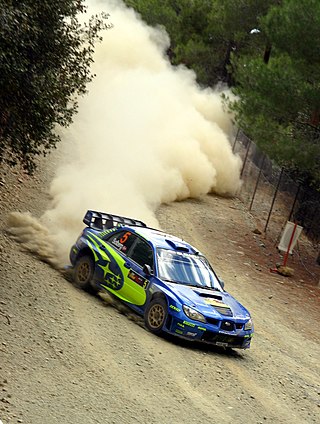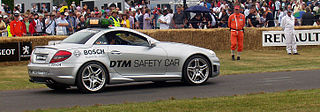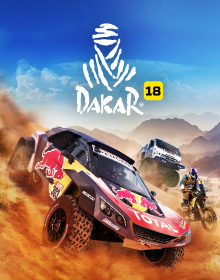
Keirin – literally "racing cycle" – is a form of motor-paced cycle racing in which track cyclists sprint for victory following a speed-controlled start behind a motorized or non-motorized pacer. It was developed in Japan around 1948 for gambling purposes and became an official event at the 2000 Olympics in Sydney, Australia.

In sports, racing is a competition of speed, in which competitors try to complete a given task in the shortest amount of time. Typically this involves traversing some distance, but it can be any other task involving speed to reach a specific goal.

Rallying is a wide-ranging form of motorsport with various competitive motoring elements such as speed tests, navigation tests, or the ability to reach waypoints or a destination at a prescribed time or average speed. Rallies may be short in the form of trials at a single venue, or several thousand miles long in an extreme endurance rally.
Motorsport(s) or motor sport(s) are sporting events, competitions and related activities that primarily involve the use of automobiles, motorcycles, motorboats and powered aircraft. For each of these vehicle types, the more specific terms automobile sport, motorcycle sport, power boating and air sports may be used commonly, or officially by organisers and governing bodies.

Targa Newfoundland, the ultimate tarmac-based car rally in North America, began in 2002 in the province of Newfoundland and Labrador, Canada and races over scenic coastal roads and through towns and outports. The event covers about 2,000 km (1,200 mi) in September of each year on eastern and central parts of the island of Newfoundland. The next Targa Newfoundland rally will be held September 11-18, 2025.
The Great Race is a classic rally for street-legal vintage automobiles at least 45 years old. Vehicles must use original factory parts, and modern navigational aids like GPS are prohibited.

Érik Gilbert Comas is a French former racing driver. He was the French Formula 3 champion in 1988, and then Formula 3000 champion in 1990, after scoring the same number of points as Jean Alesi in 1989, but losing on a count-back of positions. He participated in 63 Formula One Grands Prix between 1991 and 1994, scoring a total of seven championship points. His last point, in the 1994 German Grand Prix, was also the last one for the Larrousse team. After his F1 career, he won the All-Japan GT Championship for Nismo in the top GT500 class in 1998 and 1999.

In motorsport, a safety car, or a pace car, is a car which limits the speed of competing cars or motorcycles on a racetrack in the case of a caution period such as an obstruction on the track or bad weather. The aim of the safety car is to enable the clearance of any obstruction under safer conditions, especially for marshals and/or await more favourable track conditions weather-wise. By following the safety car, the competitors' tyres remain as close as possible to operating temperature while their engines do not overheat. A safety car is also preferred over stopping the race and restarting as the latter takes longer.

Heikki Johannes Kovalainen is a Finnish racing and rally driver, who competed in Formula One from 2007 to 2013. Kovalainen won the 2008 Hungarian Grand Prix with McLaren. In sportscar racing, Kovalainen won Super GT in 2016 with SARD.

Road bicycle racing is the cycle sport discipline of road cycling, held primarily on paved roads. Road racing is the most popular professional form of bicycle racing, in terms of numbers of competitors, events and spectators. The two most common competition formats are mass start events, where riders start simultaneously and race to a set finish point; and time trials, where individual riders or teams race a course alone against the clock. Stage races or "tours" take multiple days, and consist of several mass-start or time-trial stages ridden consecutively.

A pacemaker or pacesetter, sometimes informally called a rabbit, is a runner who leads a middle- or long-distance running event for the first section to ensure a high speed and to avoid excessive tactical racing. Pacemakers are frequently employed by race organisers for world record attempts with specific instructions for lap times. Some athletes have essentially become professional pacemakers. A competitor who chooses the tactic of leading in order to win is called a front-runner rather than a pacemaker.

Enduro is a form of motorcycle sport run on extended cross-country, off-road courses. Enduro consists of many different obstacles and challenges. The main type of enduro event, and the format to which the World Enduro Championship is run, is a time-card enduro, whereby a number of stages are raced in a time trial against the clock.

The Manx Grand Prix motorcycle races are held on the Isle of Man TT Course annually, usually at the end of August and early September. Traditionally the event has been staged over a two week period but this was reduced in 2022 to nine days. 2023 saw the 100th Anniversary of the event.
Classic rallying, or historic rallying, is a type of road rally suitable for most standard classic cars, with no special equipment needed. These rallies are more about enjoyment than speed, and can be a good introduction to historic motorsport. A classic road rally is not about speed; in fact, there are severe penalties for finishing too early. The idea of a rally is to travel from a point to another within a certain time, not too fast or too slow, trying to match a speed average set by the organizers.

The motorcycle sport of racing includes motorcycle road racing and off-road racing, both either on circuits or open courses, and track racing. Other categories include hill climbs, drag racing and land speed record trials.
The Waterside Series is a series of four marathon canoe races held on the Kennet and Avon Canal and finishing at the Newbury Waterside Centre.
The following is a glossary of terminology used in motorsport, along with explanations of their meanings.
In racing, did not finish (DNF) denotes a result of a participant who does not finish a given race, either because of a mechanical failure, injury, or involvement in an accident. This may also be used in cases where the competitor has hit the time limit for the race, especially in speedcubing.

The 2016 Dakar Rally was the 38th edition of the event and the eighth successive year that the event was held in South America. The event started in Buenos Aires, Argentina on January 2, then ran through Argentina and Bolivia.

Dakar 18 is a racing video game simulation developed by Portuguese studio Bigmoon Entertainment and published by Deep Silver for PlayStation 4, Xbox One and Microsoft Windows. It is based on the annual rally raid organized by the Amaury Sport Organisation (A.S.O). It was the first officially licensed Dakar Rally game since Dakar 2: The World's Ultimate Rally in 2003.













